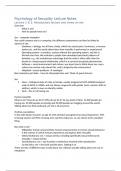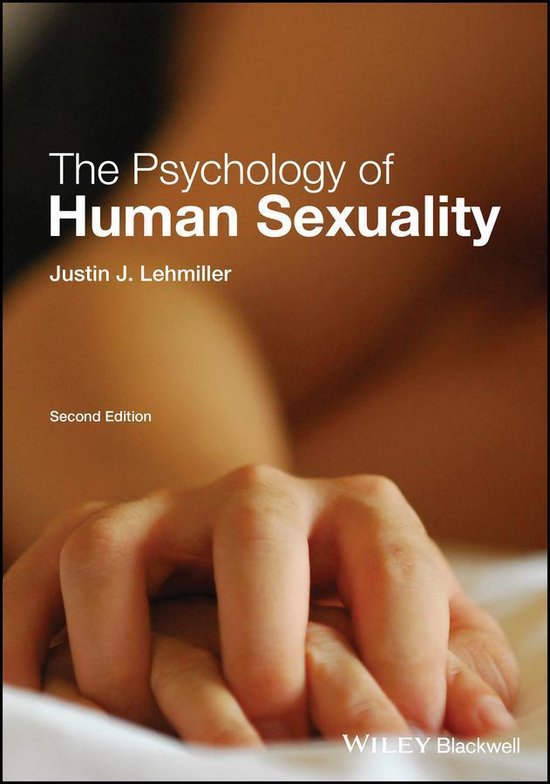Psychology of Sexuality Lecture Notes
Lecture 1 & 2: Introductory lecture and views on sex
Overview
- What is sex?
- How do people have sex?
Sex – computer metaphor
You could compare sex to a computer, the different components can then be linked to
aspects of sex:
- Hardware = biology, we all have a body, which has sexual parts, hormones, a nervous
system etc. and this partly determines how sexuality is performed or experienced
- Operating system = evolution, useless without the operating system, and this is
formed over time, like evolution, people have developed persistent patterns of
behavior, e.g., the evolutionary advantage that the male is often older than the
female in a heterosexual relationship, which is a universal accepted phenomenon
- Software = social environment and culture, you learn how to think about sex, every
culture has certain rules about this, and is shaped by the environment
- Helpdesk = sexual problems sexologist
But computers get older… how do old people have sex? (Topic of guest lecture)
Sex
Noun – biological state of male or female, usually assigned at birth (AMAB (assigned
male at birth) or AFAB), and not always congruent with gender (man, woman, both or
neither), which is more an identity matter
Verb – the act of having sex
Human sexuality
What is sex? How do we do it? Why do we do it? At any point of time, 14.000 people are
having sex, 25.000 people are kissing and 50.000 people are hugging around the world.
Talking about sex feels awkward, yet sex is all around us
Positive associations
In line with Dutch research: at age 25, 81% of Dutch youngsters has sexual experience. 90%
of young women and 94% of young men say they enjoy sex, so, sex seems to be a positive
thing
But what is sex?
- Wikipedia: human sexual activity, human sexual practice or human sexual behaviour
is the manner in which humans experience and express their sexuality
- Oxford dictionary: sex = sexual activity, including specifically sexual intercourse;
sexuality = sexual activity
- Yourdictionary: sex = any function or behaviour involved with reproduction
- Go Ask Alice: sex = the birds and the bees. Getting it on
There are lots of different ways to talk about sex, without actually talking about sex, lot of
metaphors
,How do you define having sex?
Can be useful to look at sexual behaviours in order to define it, so, how do people have sex?
- Not
o Asexuality (versus allosexuality), they have no desire for partnered sex, which
is not the same as lacking romantical attraction. There are also people
between these two mentioned categories, which can be called gray sexuality.
Some asexual people do have sex, e.g., because their partner wants to
o Voluntary celibacy, they do feel sexual attraction, but have chosen not to act
on it, think for example about nuns
o Involuntary celibacy (incel = people on the internet, white heterosexual males,
that talk about the feeling they have that they are entitled to have sex but are
denied the right, can lead to terror threats), people that do have the need for
sex but are unable to have sex, e.g., unable to find a partner, partner is
recently deceased, can be due to separation from your partner, or because of
institutional restrictions (e.g., being hospitalized), physical limitations etc.
- Solitary sexual behaviours
o Sexual fantasy: any mental picture that comes to mind while you’re awake,
that turns you on, they are very common, both men and women fantasize and
almost always about the same things, there are hardly any gender differences.
Sexual fantasies are considered healthy. Some of the most common ones:
Multi-partner sex
BDSM: bondage, discipline, dominance, submission, sadism, and
masochism
Novelty, adventure, and variety
o Masturbation, “Don’t knock masturbation: it’s sex with someone I love” –
Woody Allen in Annie Hall, 1977. For people with a penis, it’s called jerking off
and for people with a vulva it’s called fingering. In the Netherlands the
prevalence of masturbation is
quite high, as you can see on
the graph. More men than
women masturbate and it’s
more common among young
people, white persons and
people with a higher education. Nowadays, masturbation is considered
healthy, for example it gives women a higher self-esteem and it lowers the
risks of prostate cancer in boys, and it has been shown to improve your
immune system a bit. But in some cases, it can be dangerous: “about 100 men
in Germany die every year while masturbating, according to a study by
forensic examiners”, probably due to the fact that when you are aroused you
are in a sort of ‘tunnel-vision’, you tend to think that risks are lower than they
actually are because you are only focusing on reaching sexual gratification
- Partnered sexual behaviour (! Sex is only sex if all partners consent. If there is no
consent, we call it sexual assault or sexual abuse or rape), non-consensual sex, sexual
abuse and sexual violence including kissing and touching is seen for 53% among
women and 19% across men, the percentages for sexual violence are 22% for women
and 6% for men. Women are thus more at risk, but it also happens with men. Most
frequently observed behaviours for partnered sexual behaviours are:
, o Kissing, however, this is not a universal accepted behavior, but in the western
culture it often is
o Touching, doesn’t have to include the genitals, the body can have multiple
erogenous zones
o Manual sex, where the touching is focused on the genitals
o Oral sex (fellatio (oral stimulation of the penis; blowjob)/cunnilingus (oral
stimulation of the vulva), more frequent among youngsters with a high
education and white. In some cultures, oral sex is considered unnatural or
even unclean
o Anal sex (intercourse or anilingus), not as frequent as the other activities, but
becoming more common and most frequent among young adults with a high
education. Often associated with gay men, but among them not the most
frequent sexual behavior
o Vaginal intercourse (coitus), most frequent form of partner sexual activities.
Four basic positions (most popular/best known):
Man on top, missionary, preferred by women
Woman on top, amazone/cowgirl, preferred by men. The reverse
cowgirl however can be considered quite dangerous, the penis can
actually break
From behind, doggystyle
Sideway, spooning
You also have the CAT position (Coital Alignment technique), which is
best for clitoral stimulation, almost identical to missionary but the men
is a bit higher up and is
(almost) Mostly Usually (almost)
more ‘grinding’ than
always yes, not, never
thrusting
sometimes sometime
no s yes
Reaching orgasm during coitus
Men 66% 26% 5% 3%
Not as easy as it seems, men more often reach
an orgasm = orgasm gap. It is also quite hard to Women 18% 18% 17% 46%
reach an orgasm simultaneously, the numbers (almost) Mostly Usually (almost)
for this are shown in the second graph. On top always yes, not, never
of those numbers 4% of men don’t know sometimes sometime
whether they reached an orgasm no s yes
simultaneously and 2% of women don’t know. Men 3% 18% 40% 4%
You do see a discrepancy between men and Women 3% 10% 34% 51%
women, could be because women fake an
orgasm. There is more than coitus, but is it considered sex?
How do people define having sex?
In the United States: 95% regarded penis in vagina as sex, 75% penis in anus, oral sex only in
30% of the cases and manual sex only for 12%. In the Netherlands the numbers about what
people consider as sex are as follows: 99% penis in vagina, 93% penis in anus, 75% oral sex,
66% manual sex. So, in the Netherlands people more often have a wider view about sexual
behavior
Coital imperative
, The notion that ‘real’ sex equals penetration of the vagina by the penis (coitus) and placing
this particular sexual act as central to ‘normal’ hetero sex (the goal of hetero sex so to say).
Some sort of behavioral script, that when you have sex with a partner it should lead up to
coitus. As seen females hardly reach orgasms with coitus, so if we act on the coital
imperative the orgasm gap will remain
How do homosexual people define having sex?
- Homosexual men: insertive anal intercourse 91%, receptive anal intercourse 90%,
mutual oral stimulation (69) 64%, oral-genital stimulation 62%, oral anal stimulation
(rimming) 52%
- Homosexual women: mutual oral stimulation (69) 80%, oral-genital stimulation 77%,
dildo in vagina 74%, double-ended dildo 73%, manual genital stimulation 70%,
rubbing genitals (scissoring) 69%, dildo in anus 64%, mutual manual-genital
stimulation 63%, oral anal stimulation (rimming) 52%. Here you see an even wider
repertoire of what they consider to be sex
Shows the importance of defining sex, when you ask someone if they had sex, you still don’t
know much, because they might consider something completely different as sex then you do
What is sex?
Bottomline is that sex is complex. Sex is more than just the coitus:
- Sex is all behaviour that arouses us (via touch, hearing, vision, smell)
- Mostly focused on genitals
- Often leads to orgasm
- Sex is only sex if all partners consent Age first 2005 2012 2017
time,
The ‘sexual career’ in the Netherlands median
The median age over time gets higher, the sequence Deep 13.5 14.4 15.8
does remain the same (starting off with kissing and kissing
leading up to coitus). Why the age goes up is unclear Feel and 15.5 15.2 16.5
caress
Former beliefs about sex Manual 16.7 16.3 17.6
For centuries the idea has been that sex is: sex
- Heterosexual penis-vagina coitus Oral sex 17.2 17.1 17.9
- Where the man has an orgasm (woman not Coitus 17.1 17.1 18.6
necessarily)
- Within a monogamous relationship (preferably marriage)
- With the aim of reproduction
As you see, there is nothing here about pleasure or intimacy, it is very basic
Why do humans have sex?
Biologists will say: “The goal of sex is mixing of genes and survival of the species”. But that is
the result of sex, not the motivation. So, why do people have sex?
- Procreation: sex for reproduction. If this is the aim than sex is considered
heterosexual coitus, aimed at passing on genes
- Recreation: sex for pleasure. Sex is then any behaviour – solo or with partner –
focused on satisfying sexual desire





